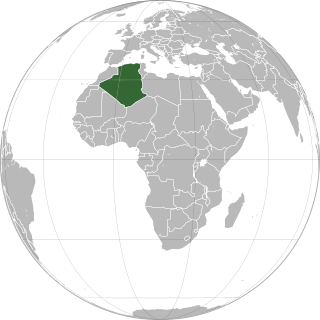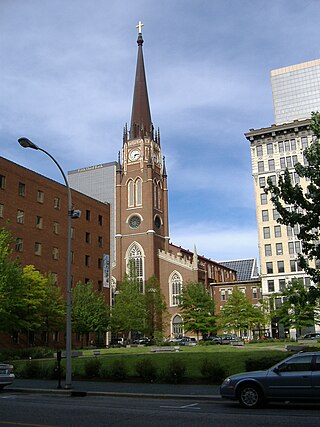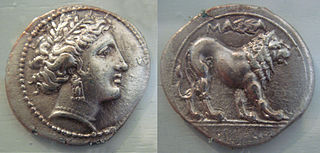Related Research Articles

The demography of France is monitored by the Institut national d'études démographiques (INED) and the Institut national de la statistique et des études économiques (INSEE). As of 1 January 2021, 65,250,000 people lived in Metropolitan France, while 2,785,000 lived in overseas France, for a total of 68,035,000 inhabitants in the French Republic.

Demographic features of the population of Algeria include population density, ethnicity, education level, health of the populace, economic status, religious affiliations and other aspects.

Oran is a major coastal city located in the northwest of Algeria. It is considered the second most important city of Algeria, after the capital, Algiers, because of its population and commercial, industrial and cultural importance. It is 432 km (268 mi) west-southwest from Algiers. The total population of the city was 803,329 in 2008, while the metropolitan area has a population of approximately 1,500,000, making it the second-largest city in Algeria.

Islam in France is a minority faith. Muslims are estimated to represent around 4% of the nation's population as per the Statista and Le Monde, although Insee claims that in metropolitan France this percentage can reach 10%, and France is estimated to have the largest number of Muslims in the Western world, primarily due to migration from Maghreb, West African and Middle Eastern countries. After conquering much of the Iberian peninsula, the Umayyad Muslim forces invaded modern day southern France, but were decisively defeated by the Frankish Christian army led by Charles Martel at the Battle of Tours in 732 AD, thus preventing the subsequent Islamisation of the Western Europe.

Maghrebi Jews or North African Jews are ethnic Jews who had traditionally lived in the Maghreb region of North Africa under Arab rule during the Middle Ages. Established Jewish communities had existed in North Africa long before the arrival of Sephardi Jews, expelled from Portugal and Spain. Due to proximity, the term 'Maghrebi Jews' sometimes refers to Egyptian Jews as well, even though there are important cultural differences between the history of Egyptian and Maghrebi Jews. These Jews originating from North Africa constitute the second largest Jewish diaspora group.

The History of the Jews in Algeria refers to the history of the Jewish community of Algeria, which dates to the 1st century CE.

Religion in France is diverse, with Christianity being the most widely professed faith. The nation's religious diversity can be attributed to its adherence to secularism, freedom of religion and freedom of thought, as guaranteed by the 1789 Declaration of the Rights of Man and of the Citizen. The Republic is based on the principle of laïcité established by the 1880s Jules Ferry laws and the 1905 French law on the Separation of the Churches and the State.

According to the French national institute of statistics INSEE, the 2021 census counted nearly 7 million immigrants in France, representing 10.3% of the total population. This is a decrease from INSEE statistics in 2018 in which there were 9 million immigrants in France, which at the time represented 14% of the country's total population.

Religion in Europe has been a major influence on today's society, art, culture, philosophy and law. The largest religion in Europe is Christianity, but irreligion and practical secularisation are strong. Three countries in Southeastern Europe have Muslim majorities. Ancient European religions included veneration for deities such as Zeus. Modern revival movements of these religions include Heathenism, Rodnovery, Romuva, Druidry, Wicca, and others. Smaller religions include the Dharmic religions, Judaism, and some East Asian religions, which are found in their largest groups in Britain, France, and Kalmykia.

Christianity came to North Africa in the Roman era. According to historian Theodor Mommsen what is now Mediterranean Algeria was fully Christian by the fifth century. A notable Berber Christian of Algeria was Saint Augustine, important saints in Christianity. Christianity's influence declined during the chaotic period of the Vandal invasions but was strengthened in the succeeding Byzantine period. After the Arab invasions of the 7th century, Christianity began to gradually disappear.

Religion in Atlanta, while historically centered on Protestant Christianity, now involves many faiths as a result of the city and metro area's increasingly international population. While Protestant Christianity still maintains a strong presence in the city, in recent decades Catholic Christians have gained a strong foothold due to migration patterns. Atlanta also has a considerable number of ethnic Christian congregations, such as Korean Baptist, Methodist, and Presbyterian Churches, the Tamil Church Atlanta, Telugu Church, Hindi Church, Malayalam Church, Ethiopian, Chinese, and many more traditional ethnic religious groups. Large non-Christian faiths are present in the form of Buddhism, Judaism and Hinduism. Overall, there are over 1,000 places of worship within Atlanta.

Ethnic groups in Algeria include Arabs and Berbers, who represent 99% of the population, of which 85% are Arab and about 15% are Berber. Algeria also has a minority population of Europeans that represents less than 1% of the population. The minority European population is predominantly of French, Spanish, and Italian descent.
North African Americans are Americans with origins in the region of North Africa. This group includes Americans of Algerian, Egyptian, Libyan, Moroccan, and Tunisian descent.
Antisemitism in France has become heightened since the late 20th century and into the 21st century. In the early 21st century, most Jews in France, like most Muslims in France, are of North African origin. France has the largest population of Jews in the diaspora after the United States—an estimated 500,000–600,000 persons. Paris has the highest population, followed by Marseilles, which has 70,000 Jews. Expressions of antisemitism were seen to rise during the Six-Day War of 1967 and the French anti-Zionist campaign of the 1970s and 1980s. Following the electoral successes achieved by the extreme right-wing National Front and an increasing denial of the Holocaust among some persons in the 1990s, surveys showed an increase in stereotypical antisemitic beliefs among the general French population.

Marseille is the prefecture of the French department of Bouches-du-Rhône and capital of the Provence-Alpes-Côte d'Azur region. Situated in the Provence region of southern France, it is located on the coast of the Gulf of Lion, part of the Mediterranean Sea, near the mouth of the Rhône river. Its occupants are called Marseillais.

Religion in Louisville, Kentucky, includes religious institutions of various faiths; including Christianity, Judaism, Islam, Hinduism, Buddhism and Sikhism.

The Paris metropolitan area has a large Maghrebi population, in part as a result of French colonial ties to that region. As of 2012 the majority of those of African origin living in Paris come from the Maghreb, including Algeria, Morocco, and Tunisia. There were 30,000 people with Algerian nationality, 21,000 persons with Moroccan nationality, and 15,000 persons with Tunisian nationality in the city of Paris in 2009. In addition, there were thousands of Maghrebi Jews who fled the Maghreb as a consequence of the post-World War II Jewish exodus from Arab and Muslim countries.
Algerians in France are people of Algerian descent or nationality living in France. People of Algerian origin account for a large sector of the total population in France. Some immigrated during colonial rule in Algeria starting in the 1920s, and large numbers chose to emigrate to France from the 1960s onwards due to political turmoil in Algeria.

Marseille, France was originally founded circa 600 BC as the Greek colony of Massalia and populated by Greeks from Phocaea. It became the preeminent Greek polis in the Hellenized region of southern Gaul. The city-state allied with the Roman Republic against Carthage during the Second Punic War, retaining its independence and commercial empire throughout the western Mediterranean even as Rome expanded into Western Europe and North Africa. However, the city lost its independence following the Roman Siege of Massilia in 49 BC, during Caesar's Civil War, in which Massalia sided with the exiled faction at war with Julius Caesar.
References
- ↑ "Archdiocese of Marseille". Catholic hierarchy. 1 January 2020.
- 1 2 "2011 Census: KS209EW Religion, local authorities in England and Wales". ons.gov.uk. Retrieved 15 December 2012.
- ↑ Ingram, Mark (2011). Rites of the Republic: Citizens' Theatre and the Politics of Culture in Southern France. University of Toronto Press. p. 103. ISBN 9781442693791.
An overview of Marseille's European Capital of Culture campaign Today, thirty ethnic groups live together in the heart of Marseille: the city counts 80,000 Armenian Orthodoxs, 200,000 North Africans and Africans, 70,000 Comorians.
- ↑ "Marseille's Ethnic Bouillabaisse". Smithsonian. 1 December 2007.
- 1 2 3 "El número de inmigrantes españoles en Francia se ha duplicado con la crisis". 28 November 2014.
- 1 2 "Qui sont les nouveaux immigrés qui vivent en France ?".
- ↑ Taylor, Adam (2015-01-09). "Map: France's growing Muslim population". Washington Post. ISSN 0190-8286 . Retrieved 2017-09-19.
- ↑ "Resentment grows between Christians and Muslims in France". PBS NewsHour. 2015-01-09. Retrieved 2017-09-19.
- ↑ A survey of high-school students carried out in 2000–2001 suggests that 30–40 per cent of young people have a Muslim background, F. Lorcerie, "Cités cosmopolites. Sur les identités sociales des lycéens marseillais" (Cosmopolitan estates. On the social identities of high-school students of Marseille), Report for FASILD, IREMAMCNRS, Aix-en-Provence, January 2005. Survey carried out with V. Geisser and L. Panafit.
- ↑ Azadé, Annabelle (2015-03-03). "Marseille's Muslims need their Grand Mosque – why is it still a car park?". The Guardian. ISSN 0261-3077 . Retrieved 2017-09-19.
- ↑ Lorcerie & Geisser 2011 , p. 35
- ↑ Lorcerie & Geisser 2011 , p. 104
- ↑ Lorcerie & Geisser 2011 , p. 66
- ↑ Paul Gaujac, Le Corps expéditionnaire français en Italie, Histoire et collections, 2003, p. 31
- ↑ Anthony Clayton, France, Soldiers, and Africa, Brassey's Defence Publishers, 1988
- ↑ Belkacem Recham, Algerian muslims in the French Army (1919–1945), L'Harmattan, 1996
- ↑ John Gimlette, Panther soup: travels through Europe in war and peace, Alfred A. Knopf, 2008, p.75
- ↑ Lorcerie & Geisser 2011 , p. 101
- ↑ Zaman France. "La communauté turque compte 611.515 personnes en France". Archived from the original on 2014-12-21. Retrieved 2014-12-21.
- ↑ "Marseille: Open Databases". The Museum of the Jewish People at Beit Hatfutsot . Retrieved 18 September 2017.
- ↑ Ruiz, Teofilo F. (14 August 2017). The Western Mediterranean and the World: 400 CE to the Present. John Wiley & Sons. p. 255. ISBN 9781118871423 . Retrieved 18 September 2017.
- ↑ Liphshiz, Cnaan (August 8, 2017). "It's Jew vs. Jew in France as conflict over women reading Torah turns ugly". Jewish Telegraphic Agency . Retrieved September 20, 2017.